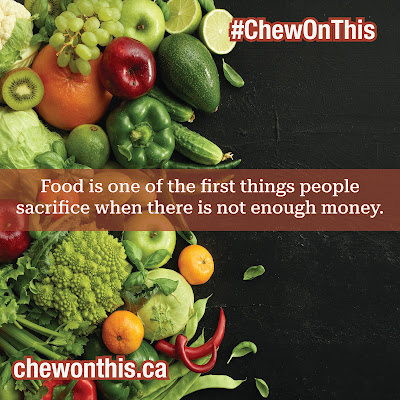Yesterday for International Day to Eradicate Poverty #IDEP2022 we shared a film (link to our Chew on This! Actions) and supported virtual community conversations about food security in Alberta. We are proud to sign this letter in solidarity with Chew on This! and Dignity for All partners that went to eight Members of Parliament. The letter is endorsed by many groups, organizations, and provincial and municipal groups across Canada. #Chewonthis
The letter and recommendations can be read below. Link to the PDF.
October 17 is the International Day for the Eradication of Poverty. Dignity for All, along with Chew on This! Supporters across the country are calling on the federal government to implement equitable and effective policies to eradicate poverty and food insecurity.
Canada has signed international human rights commitments and has a duty to uphold the rights of all people in this country. In 2015, Canada adopted the Agenda 2030 Sustainable Development Goals, which include targets for (1) No Poverty and (2) Zero Hunger.
Reports from ESDC say they are on track to meet, or even exceed, the targets of their Poverty Reduction Strategy. But even with these improvements, millions are being left behind. Rates of food insecurity have continued to climb, with a provincial average of 15.9% in 2021 (approximately 1 in 6 households), and even higher rates in the territories.
- Poverty and food insecurity disproportionately impact people who are Black, Indigenous, or disabled, and people with precarious immigration status. 28.9% of Black households and
- 28.2% of Indigenous households live with food insecurity, compared to just 11% of white households
- 1 Food insecurity rates intensify for people with intersecting forms of oppression, such as those who are 2SLGBTQ+, women, single mothers, and young adults.
Food insecurity is not about a lack of food, it is about a lack of income and access. Social
assistance rates (including welfare and disability supports) fall short of the poverty line in every province and territory2 with 63.1% of recipients’ households experiencing food insecurity. 3 But this issue must be tackled by the federal government as well. 13.7% of households whose main source of income is employment are also food insecure.4
Inadequate wages and income supports are compounded by high costs of housing, childcare, medical needs, and other essentials, leaving millions of people sacrificing their food budgets when there isn’t enough money to pay for rent and other “non-negotiable” expenses.
Food charity is not the solution.
Food security requires food systems that provide safe working conditions for all workers and can adapt to climate change pressures. Food security requires income security and affordable housing. It requires empowering and funding community-led local and sustainable solutions. It requires recognizing food sovereignty for Indigenous and Black people.
We have outlined 4 policy recommendations that address some of the underlying causes of food insecurity in Canada and its disproportionate impacts among equity-seeking groups.
1. Increase income security: Increase federal income benefits, including Employment
Insurance, the Canada Worker’s Benefit, Canada Disability Benefit, Guaranteed Income
Supplement, Canada Housing Benefit, and the Canada Child Benefit, to reflect current
gaps and inadequacies. Expand eligibility to ensure all people living in Canada are
automatically enrolled for benefits.
2. Status for All: Give everyone living in Canada permanent resident status to ensure that
they have access to fair wages, worker protections, healthcare, EI, and other government
benefits and programs.
3. Subsidise Food Shipping Costs to the North: While this recommendation will not
address all forms of food insecurity in northern communities, increasing government
subsidies for food shipping expenses will make food costs immediately more affordable
for residents.
4. Support Community-led Programs & Food Sovereignty: Provide stable, adequate
funding to community-run and non-profit food programs (particularly for Indigenous and
Black-led organizations), recognizing community members with lived experience of food
insecurity as experts in what services and food options are needed.
This letter has been endorsed by organizations and advocates across the country and across
sectors (please see the full list of signatures below). We would be grateful for the opportunity to meet with you to provide more information specific to your respective mandates and our policy recommendations.

No comments:
Post a Comment
Thank you for posting to our blog and joining our community.